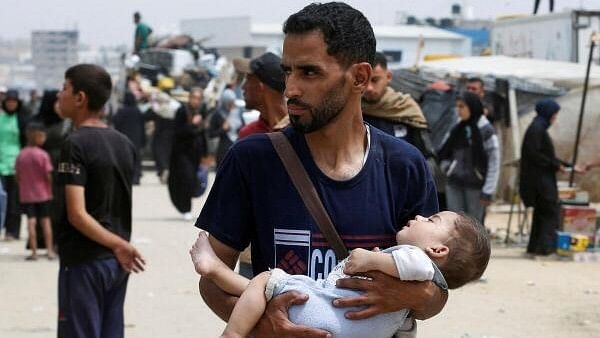
A man carries a child, as Palestinians travel on foot along with their belongings as they flee Rafah due to an Israeli military operation, in Rafah, in the southern Gaza Strip, May 28, 2024.
Credit: Reuters Photo
The United Nations said on Tuesday that it was struggling to maintain its operations in the Gaza Strip because of Israel’s expanding military offensive in Rafah, including a devastating strike on a camp for displaced Palestinians that killed at least 45 people and the continued airstrikes near the UN offices in north Rafah.
“We want this to stop,” the UN’s chief spokesperson, Stéphane Dujarric, said Tuesday.
Over the past two days, officials and senior diplomats at the UN have issued statement after statement, expressing not only condemnation of the strike Sunday but also frustration that they have been unable to stop the war and the suffering of civilians.
The strike and a resulting fire killed at least 45 people, including children, Gazan Health Ministry officials said. Videos reviewed and verified by The New York Times showed fires raging through the night as people frantically pulled bodies from the rubble, shouting in horror as they carried the charred remains out of the camp. In one video, a man held a headless child as fire engulfed a structure behind him.
The UN Security Council held an emergency consultation meeting behind closed doors Monday afternoon and was scheduled to hold an open emergency meeting Wednesday morning to discuss the situation in Rafah.
Nicolas de Rivière, France’s ambassador to the UN, told reporters before Wednesday’s meeting that “there is no safe zone for Palestinian civilians in Rafah.” He called on the Council to adopt a new resolution calling for a cease-fire. “This Israeli operation must stop immediately as requested by the International Court of Justice,” he said, also calling for the immediate release of hostages.
Since the war began last October, the United States has blocked the Council from demanding a cease-fire with three vetoes. In December, Washington abstained from a resolution that called for a humanitarian cease-fire for Ramadan. That resolution passed, but no cease-fire has ever materialized. Negotiations between Israel and Hamas for a cease-fire in exchange for the release of hostages, mediated by the U.S, Egypt and Qatar, have reached an impasse.
Even if the US allows a cease-fire resolution to pass, it is unclear whether Israel or Hamas would heed it. Israel has shrugged off widespread international condemnation, including from some of its allies, over its conduct in Gaza. Hamas, a terrorist organization, does not abide by international laws of conflict.
António Guterres, the UN secretary-general, condemned Israel’s attack on Rafah and warned that the humanitarian catastrophe in Gaza was worsening. He said in a statement Tuesday that the only solutions were an immediate end to the conflict and the release of hostages and said “the humanitarian catastrophe in Gaza is now compounded by the unconscionable prospect of a man-made famine.”
Efforts to alleviate severe hunger were still being crippled by the continued fighting in Rafah, officials said, which was one of the main border crossings for aid convoys coming from Egypt.
Juliette Touma, spokesperson for the United Nations Relief and Works Agency, the main UN agency that aids Palestinians, said Tuesday that little aid has trickled in— about 200 trucks in a period of three weeks as opposed to more than 500 plus trucks a day that UN officials say is needed.
Workers face barriers to distributing the aid that does arrive, she said, among them heavy movement restrictions imposed by the Israeli authorities, airstrikes, the expanded military operation in Rafah and recent rocket strikes by Hamas. Not enough fuel is being delivered to Gaza to support humanitarian operations, she added.
“The humanitarian space is shrinking by the hour, by the day, because of all the restrictions placed on us,” Touma said.
Touma said that UNRWA staff in Rafah, where the agency has its headquarters and main warehouses, was unable to come to work Tuesday because of the Israeli airstrikes and because they were packing to move with their families.